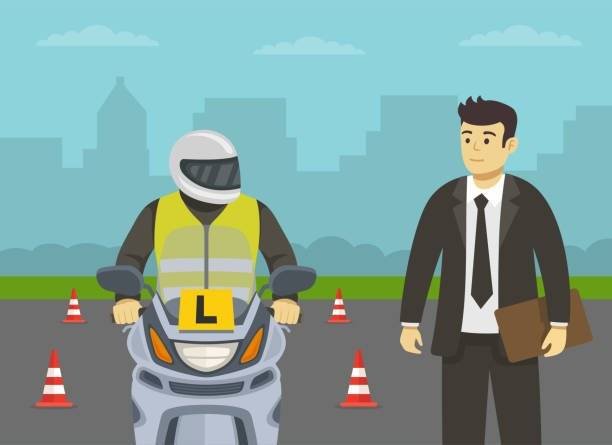In the early days of motorcycle aspirants, the journey of opening the road starts with an approved motorcycle theory test. This critical analysis will act as a brick wall to block the entry of motorcycle drivers onto the road; only those riders who genuinely have the knowledge and ability can get on the road. On the other hand, the test can make you weary, and if you are not accustomed to the world of two-wheeled expeditions, you will likely have some apprehension. That’s where you need to practice, and you will get the knowledge, and you will face the exam with self-confidence. So we are going to explore motorcycle theory test practice.
A motorcycle theory test exam focuses on the key learning objectives, including road safety, rules and regulations of the road, and correct riding techniques.
The motorcycle ABT is a comprehensive assessment through which you will establish an in-depth understanding of road signs, traffic rules, and safe riding practices. It is a comprehensive course with topics such as vehicle control, vehicle maintenance, risk perception, defensive driving, and many more. This test will give you the required level for a motorcycle license, which is one of the crucial steps in motorcycle riding.
Practicing the theory test may look fascinating in the beginning, but when done well, it becomes more comfortable, and the chances of you succeeding may be culminating. The more you work at it and the more you make your preparation familiar by taking trial tests, the more likely you are to treat the real exam with a cool and collected mindset.

Specifics of Motorcycle Theory Test Practice.
Study Materials:
Invest in the latest motorcycle theory test study guide or parameter. These exclusive tools include a syllabus with all the material you will be tested on and a dedicated instructional approach to them with sample questions that lead you to better understand these concepts. Setting aside time to scrupulously review the resources will be a prerequisite to having them provide a sufficiently strong foundation for knowledge acquisition.
Online Practice Tests:
Online theory test practice for motorcycles is packed with theory test practice materials, namely, learning aids, simulations, and mock exams. With these tools, there is an opportunity to check what you know, but you also get immediate feedback on the course of action that should be followed to eliminate the areas that need more attention.
Smartphone Apps:
Nowadays, there are dozens of cool mobile apps for Android or iOS that offer stress-free studying and the opportunity to test your motorcycle theory knowledge in real-life situations. This means you can use these handy tools to go over work during your commute, lunch break, anywhere you have time and any free time you can manage throughout your day.
Study Groups:
Studying to get a good score on the motorcycle theory test, and joining or forming a study group can make this process less daunting. Group learning settings promote collaborative discussions, insights, hearsay, and the opportunity to learn from one another’s backgrounds and perspectives.

Preparing for the Motorcycle Theory Test: A Guide: Tips and Tricks
Start Early:
Procrastination is, undeniably, the chief factor that hampers the right and thorough progress leading to outcomes. Organize your motorcycle theory test preparation activities very early in advance of the exam day in a bid to boost your success chances. This will provide adequate time for the subject’s thorough study and proper editing; thus, the anxiety will be minimal, which, in turn, will lead to better performance during the exam.
Create a Study Plan:
Build up a study plan that will include different modes of motorcycle theory test practice and assessment. Designate certain periods to study, do quizzes, and revise or review the subjects to have a balanced preparation schedule.
Focus on Areas of Weakness:
As you go through your theory test practice, establish the subject matter or skill that is causing you to stumble. Spend a bit more time and make a lot of effort to raise your weaknesses and achieve an all-round knowledge of what is in the course curriculum.
Practice time management:
In the examination point that brings time management into play, it is most important. As a part of your preparation, practice tests should also be timed to emulate the real test environment, and you should develop your pace.
Visualize Success:
Positive visualization could be the best way in which we can battle confidence deterioration and heightened anxiety. As you line out this very important milestone and see that you can accomplish much, keep your positive attitude through the preparation journey.
Conclusions about Motorcycle Theory Test Practice
Forging the way into being a motorcycle rider is, by all means, a commendable undertaking that requires grit and a great deal of knowledge. Motorcycle theory test success becomes more achievable when best practice techniques are used for study. As a result, you will become highly knowledgeable and confident. Bear in mind that the theory test is not a barrier but rather a foot forward along the road to independence, empowerment, and the joy and freedom of riding on two wheels.
Allot time for studying the materials as well as using practice tests; shake your skills too. If your support is not enough or if you are deeply performing on a certain topic, then seek help from study groups or mentors and constantly check on the topics that you are finding difficult. Eventually, with determination and a surround sound of comprehensive knowledge of roaring on through a motorcycle theory test in tow, you will be one step ahead of others as the laser focus on the road winds up, with great excitement of the open road and proudly becoming one of the riders of the elite of the crop.

FAQs about Motorcycle Theory Test Practice
What is the motorcycle theory test? How hard is it to pass?
It will be much harder to be involved with the motorcycle theory test in some places due to different grades concerning the state or region where you live. On the other hand, it primarily tests your knowledge of traffic legislation, road signs, safe riding etiquette, and the simple operation of the motorcycle. With the help of dedicated study of motorcycles, test-taking usually becomes as trivial as it possibly can be progressing this way through preparation and hard work.
Is there a limited number of questions on the motorcycle theory course, like on any other theory test?
The number of questions asked during the test of a motorcycle license may vary from 10 to 50 or more, depending on your location. Some tests contain both multiple-choice and true/false questions to gauge your understanding, and some may require you to decide on a given scenario. In searching for the precise number of questions and format for your region, it’s important to fully get ready for the exam.
